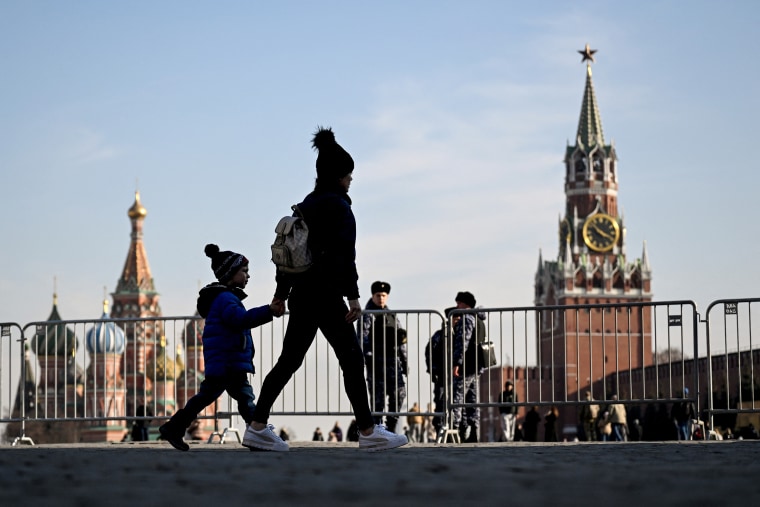Russia proposes ban on child-free lifestyle
Russia’s fight against the West and its values has taken aim this week at an “ideology” that the Kremlin and its allies say threatens the country’s very foundations: people not wanting to have children.
Lawmakers have proposed a ban on “propaganda of conscious refusal to bear children,” Vyacheslav Volodin, the speaker of the lower house of parliament and an ally of President Vladimir Putin, said in a post on Telegram on Tuesday.
It is the latest effort by authorities to combat the demographic strain of falling birth rates, exacerbated by the war in Ukraine, which the Kremlin says could threaten the country’s long-term outlook. In July, Kremlin spokesman Dmitry Peskov called Russia’s declining birth rate “catastrophic for the future of the nation.”
The issues at the heart of it are not limited to Russia — indeed they have emerged as flashpoints in the U.S. presidential election — but the move this week is just the latest step in a Kremlin campaign to promote what it casts as “traditional values” as it reshapes Russian society around Putin’s war and embraces an existential clash with the United States and allies.
The bill would tackle what Volodin said was the promotion of the “ideology of childlessness” and the “childfree movement” on the internet, in the media, in movies and even in advertisements, citing what he said where frequent online displays of “disrespect for motherhood and fatherhood, aggression toward pregnant women and children, and members of large families.”
It will come with heavy fines, he said, of up to $4,300 for individuals and more than $53,000 for legal entities. “A close-knit and large family is the basis of a strong state,” Volodin added.
It’s not clear how exactly this legislation would be enforced if enacted, and what exactly would constitute a violation, but it comes amid an already unprecedented crackdown on dissent more than 2 1/2 years into Russia’s full-scale invasion of its neighbor.
The bill was formally introduced in the State Duma, Russia’s lower house of parliament, on Wednesday, possibly signaling the Kremlin’s intention to move quickly on it. But not everyone is convinced it’s a good idea.
“I view this bill extremely negatively from all points of view, as a lawyer, as a feminist and as a woman,” said Dariana Gryaznova, a Russian lawyer and expert in women’s rights who currently lives abroad. “Bills like these are essentially directed at curbing the freedom of speech, women’s reproductive rights and their freedom to choose.”
Olga, an English teacher in Moscow, told NBC News she does not plan to have children, but is also not rejecting that possibility outright.
Olga, who did not want to give her last name for privacy reasons, said the proposed bill doesn’t change her plans. Still, it makes her feel “anxiety and slight indignation,” she said.
“It’s obvious they are trying to fix the birth rate by all means possible, and that’s what causes a lot of worries, because it will be harder for a woman to make her choices,” Olga, 39, added. “In this respect, this is nothing new for Russian women unfortunately.”
The proposed legislation carries echoes of the Russian Supreme Court’s ban on the so-called international LGBTQ+ movement in late 2023, which raised the risk of arrests and prosecutions for the already embattled LGBTQ+ community in the country.
Other recent moves highlight the growing trend.
Lawmakers in Russia’s far-east Primorsky Krai adopted legislation Wednesday prohibiting “coercing” women to terminate pregnancy.
And the Russian parliament gave its initial backing Wednesday to legislation that would ban the adoption of Russian children by people from countries that allow gender transition.
At the same time, Russia still does not have an all-encompassing domestic abuse law, despite the topic being regularly discussed in the media and intensive lobbying campaigns by group like Nasiliu.net, which means “no to abuse” in English.
“We have a very traditional, conservative society that a woman has never really been a full member of,” said Olga, the teacher.
‘Family values’
Since invading Ukraine, Russia has ramped up its fight against what it views as perverse personal freedoms championed by the West — on sexual identity, gender identity and now whether to have children.
The Kremlin says that in contrast to the “decadent” West, it’s upholding so-called “family values.”
“A woman’s purpose is to procreate — this is an absolutely unique natural gift,” Putin said in March. Earlier this month, he said the government was creating conditions for women to achieve professional success while remaining “the real soul of a large family.” Combining the two is no easy task, the Russian leader said, “but our women know how to do it and remain beautiful, gentle and charming under such stress.”

He also officially declared 2024 the “year of the family,” something that some of the wives of the men he mobilized for the war in Ukraine told NBC News earlier this year they find ironic, as the country is losing a flood of young men on the front lines just as it’s facing plummeting birth rates.
Data published by statistics service Rosstat in September shows the birth rate plummeting to its lowest in a quarter century: 599,600 children were born in Russia in the first half of 2024, 16,000 fewer than in the same period in 2023 and the lowest number since 1999.
Olga, the English teacher, doubts that banning the “childfree lifestyle” will actually improve the nation’s demographics. “But what it will do is cause more stress for people,” she said, making people even less likely to speak their minds freely.
Daria Panarina, a Moscow-based scholar studying the Philippines at Russia’s Academy of Sciences, told NBC News she has made a conscious decision not to have children. “It’s not because I read ‘childfree’ information or someone tried to persuade me not to have children. It’s just that I decided it for myself,” said Panarina, 40, adding that the proposed legislation would not change her mind.
For her, the proposed legislation is not about women’s rights per se, Panarina said, as much as the government’s effort to defend Russia’s traditional way of life.
“It’s the whole feeling that Russia is being pressed somehow and not allowed to move its own way by the collective West,” Panarina said, so all these ideas that came from the West are “seen to be really harmful, not needed here,” she added.
Although she said she understands that logic, she also doesn’t think the proposed ban would be effective. “Quite a lot of young families don’t want to have children, not because of some ideological things and some ideas that they can find on the internet, but because they first want to get their own place to live, they want to build their careers, they want to have enough money to raise their children,” she said.
‘Dangerous for everyone’
The proposed legislation will undoubtedly be wielded against Russian feminists who have been outspoken against the war in Ukraine and Putin’s regime, according to Ella Rossman, a feminist activist and scholar at the University College London School of Slavonic and East European Studies.
The regime sees a threat in their anti-war and opposition activities, Rossman said, but will likely justify punishing them under the guise of combating “childfree propaganda.”
But the proposed bill is also “dangerous for everyone,” Gryaznova, the lawyer, added, because it’s so vaguely worded.
“Even writing a thing like: ‘How can you give birth in Russia when the economy is so bad?’ Essentially, this can also be reduced to propaganda of refusal to have children,” she said.
Asked about the proposed ban, Peskov, the Kremlin spokesman, told reporters last week that anything that interferes with increasing the birth rate should “disappear” from the lives of Russians.
But Gryaznova is not convinced.
“This does not spell anything good for women’s rights in Russia,” she said. “They are trying to consolidate that the woman’s role boils down to exclusively bearing children. And this is another proof.”





